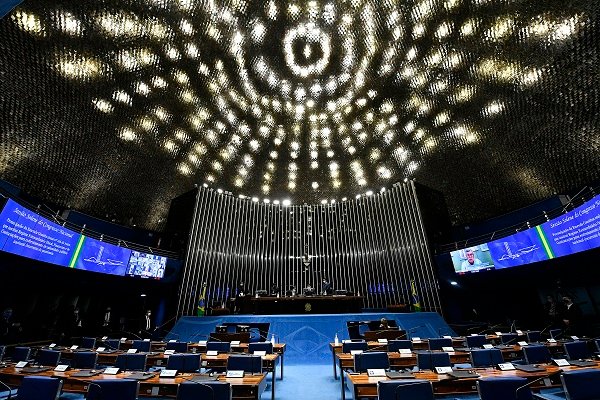In the race for the support of the Planalto Palace in the succession of the Chamber, Republican leaders Hugo Motta, and Elmar Nascimento (União Brasil), have a similar index of adherence to government agendas in the house. While PSD leader Antonio Brito has a great condition to obtain the best alignment with the executive’s agenda. However, currently, the selection of the next Chamber of Deputies president is not the only relevant subject being discussed in Brasília taking the headlines. The possible expansion of the privileged forum, proposed by Minister Gilmar Mendes in the Federal Supreme Court (STF), promises to influence the processes of figures such as former President Jair Bolsonaro.
This Content Is Only For Subscribers
To unlock this content, subscribe to INTERLIRA Reports.
Meeting with Lula
Motta was taken by Congressmen Marcos Pereira, president of his party, for a meeting with President Luiz Inacio Lula da Silva earlier this month. The congressmen have the approval of the current Chamber of Deputies President, Arthur Lira (PP), and the sympathy of governors. Elmar, in turn, was with Lula last week and tried to break resistance in the government after a turnaround that took him out of the condition of favorite.
Alignment with the Government
A survey of O Globo, based on the subjects under consideration in the plenary since the beginning of Lula’s management, shows that Motta accompanied the government’s orientation in 84% of the votes in which he participated, the same index recorded by Elmar. Brito, in turn, is the most aligned, with 95% of his votes equal to what the Palacio do Planalto wanted. The survey considered the 382 votes in which government leadership advised “yes” or “no” – was discarded at times when the position was not formalized or there was the release of political groups.
Economic Agenda
The alignment with the Executive was reflected in the economic agenda seen as a priority by the government, cases of tax reform, and the tax framework, while the differences were explicit in guidelines that caused intensification between the Executive and Congress. An example was the provisional measure on the restructuring of ministries last year: Motta and Brito voted with the government, while Elmar did not record a vote.
Lira’s Support
The president of the Chamber of Deputies, Arthur Lira (PP), signaled on Wednesday (11) that he will support Hugo Motta (Republicans-PB) for the succession to the command of the house. A day moved by conversations at closed doors, Lira joined leaders of seven parties that add up to 325 parliamentarians, more than necessary for a possible first-round victory (257).
Privileged Forum
The Federal Supreme Court (STF) may conclude this week the trial that will expand the privileged forum in cases of crimes committed in office and because of it, even after the departure of the function. The Court takes up on Friday (20) the analysis of the theme in its virtual plenary, but there are already majority votes for the extension to occur.
Impact
The new understanding must have an impact on proceedings such as those involving former President Jair Bolsonaro, who had requests for an investigation related to his position in the position sent to the Federal Court in the first instance after the end of the mandate. If the interpretation proposed by the rapporteur becomes valid, the processes related to the exercise of Bolsonaro’s function will also return to the Supreme Court.
Gilmar’s proposal
The expansion of the forum was proposed by the Dean of the Court, Minister Gilmar Mendes. He argued to keep the Supreme Court processes of authorities with the forum by prerogative of function even after the end of his mandates. The cases would only be analyzed in lower instances when the crime is committed before taking public office.
Analysis:
Both the dispute for leadership of the Chamber of Deputies and the debate on expanding the privileged forum in the Federal Supreme Court (STF) are topics that reflect structural issues of power and influence in the legislative and judicial spheres.
In the race for the succession of the Chamber, there is a strong correlation between support for the federal government’s agendas and the search for political alliances. Hugo Motta and Elmar Nascimento, both important leaders of their parties, are positioning themselves strategically to attract the support of the Planalto Palace and the Speaker of the Chamber, Arthur Lira, to consolidate their candidacies. However, Arthur Lira’s support for Motta indicates that, in addition to following the government’s agendas, the political game is strongly determined by the capacity for internal articulation, the construction of alliances, and the control of party blocs.
At the same time, the discussion on expanding the privileged forum in the STF has profound implications for Brazilian politics, especially about the protection of authorities who leave their posts. Gilmar Mendes’ proposal, which aims to keep the prosecution of authorities in the Supreme Court even after their terms have ended, indicates a possible shielding of former authorities from proceedings related to the exercise of public office. This expansion of the jurisdiction, if approved, would reinforce a feeling of impunity among political elites, while weakening the public perception that the judicial system can effectively hold political leaders accountable after they have exercised their functions.
Even though not directly related at the moment, both processes shape not only the current scenario but also the way the country will face future challenges in terms of governance, justice, and accountability.




